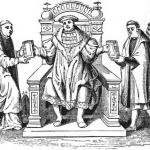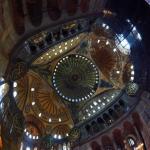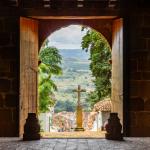In a homily for “prelates” or “preachers,” St Anthony of Padua explains what a just man is like:
A mountain, being immovable, stands for the stable life of the just man; of whom Isaiah says:
A man shall be as when one is hid from the wind,
and hideth himself from a storm:
as rivers of water in drought,
and the shadow of a rock that standeth outh in a desert land.[Is 32.2]
This is as if to say: thus will the just man be safe in tribulation, as one who hides himself in a safe place to escape wind and storm; or as one who finds clear springs in the desert; or who wards off the heat of the sun under the shade of a rock. The just man hides from the wind of the devil’s suggestions, and from the storms of worldly prosperity. He is watered by the rivers of grace in the drought of carnal desire, and he wards off the heat of the sun (worldly persecution) under the shade of the rock which protects him in tribulation, Jesus Christ. In this way, the life of the just is a ‘mountain.’[1]
If one reads through the writings of St Anthony, one of his concerns was the moral quality of the priests of his time. He found them to be lacking the stature expected for clergy, with so many falling for worldly gain (fame, wealth, an easy life) instead of being representatives of Christ in the world. His criticism drew the ire of many, because he was trying to break up the ties between worldly success and the priestly life that so many had taken for granted; on the other hand, for the poor, the needy, for those who sought spiritual guidance and strength, St Anthony’s declarations were welcomed exhortations for true godly living. Here, we see Anthony talking to priests, talking about the characteristics of the just man. Why priests? Because so many failed to live out their priestly calling, having sold their services out to the wealthy of the world. Christ came as a poor man, living with the poor, speaking on behalf of the poor; how can Christ’s representatives, the priests, seek after worldly prosperity when Christ himself denounced it in the desert? Safety is in Christ; losing one’s status in the world will mean little to the one who truly has put themselves into service for Christ; the unjust man will speak up and strike out against those who makes claims against their worldly possessions: they will speak after their own reputation and how it is ruined instead of fleeing to Christ, looking for Christ’s aid in times of trouble; the just priest, while they will suffer, will suffer in and under Christ, they will suffer with Christ. They will know their innocence and that will suffice; they will put their trust in God and let God’s will be done – even if it means they will be seen as guilty by the world, they will not care, they will not be moved. They do not look for the approval of the world, but of Christ; they will not look for earthly rewards, for fame, for they know their prize is Christ, and to live is Christ and to die is to gain. Yes, they will speak to their innocence, if they are falsely charged of some wrong doing, but they will then leave it up to God’s providence to determine what happens next. They will not be focused on themselves, for they know their focus should always be to do the work of Christ, and nothing else.
Thus the preacher must sit in the charity of humility, taught by the example of Jesus Christ, who humbled the glory of his divinity in the chair of our humanity. He should be ‘wisest’, savouring the charity which alone tastes how sweet the Lord is [cf. Ps 33.9]. He should be ‘chief’ in constancy of mind, so that like the lion, the mightiest of beasts, he may fear the attack of none. He is ‘among three’, his life, learning and eloquence. He should also be the ‘most tender little worm of the wood’: a little worm that pierces and gnaws away the wood of the hard and unfruitful; ‘tender’, that is, patient and merciful towards the humble and contrite. [2]
Anthony puts forward a picture of a godly preacher who follows God’s prompting and properly fulfills their vocation. They are merciful and kind, humble and wise, full of charity and patience. They do not look for glory; like Christ, they put off their glory for the sake of those they are called to help. They do not need worldly glory, for they have Christ. They fear no attacks, because they know themselves, they know who they are in God, and they know they have God alone to please. And yet for those who did not follow Christ’s example, those who looked after themselves and their own well being, Anthony had some choice words for them:
Alas! How many religious there are today, who still worship in the desert of religion and the cloister, the same gods that they worshiped in Egypt,the world! Because they lack the fire of charity, their sacrifice is useless to them. From morning until noon they cry out: Baal, hear us! What is ‘crying to Baal’ if not desiring to be a superior? But there is no voice, no-one who answers their will. So they cry again, still louder. To cry is to desire. They cut themselves with knives and lancets, with fasts and disciplines. They disfigure their faces, fasting early in the day, so that later on they can celebrate the festival of the belly! In Elijah’s day, the prophets of Baal cried and were not heard. Nowadays, they cry and are heard! They are promoted to higher office, so that their full is more ruinous.[3]
Worldly glory. It satisfies for a time. But when it is over – oh when it is over—how terrible a fall it is!
[1] St. Anthony of Padua, Sermons for Sundays and Festivals. Volume III. trans. Paul Spilsbury (Padua: Edizioni Messaggero Padova, 2009), 268.
[2] St. Anthony of Padua, Sermons for Sundays and Festivals. Volume II. trans. Paul Spilsbury (Padua: Edizioni Messaggero Padova, 2007), 78-9.
[3] Ibid., 142
















